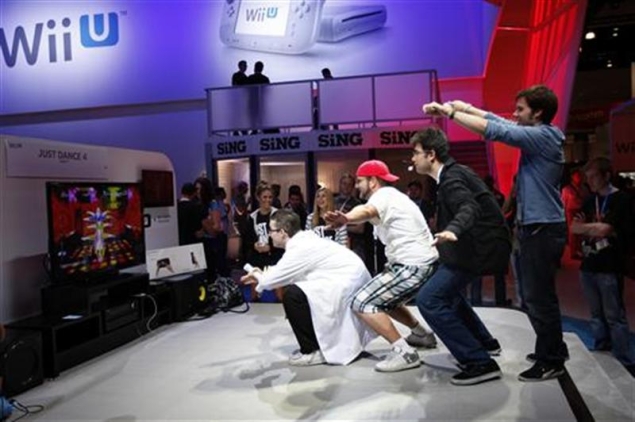- Home
- Games
- Games News
- Game consoles will survive the smartphone and tablet gaming revolution
Game consoles will survive the smartphone and tablet gaming revolution

They point to Tuesday's global roll-out of Grand Theft Auto V, the latest in a multi-billion dollar mega-franchise that dwarfs some Hollywood films, as evidence of the sector's vitality.
Although the market has come off its peak, a hard core of gamers will continue to demand their favourite titles on high-performance machines, they say.
Combined retail sales of game consoles static or portable and the software for them topped 700 billion yen ($7 billion) in Japan in 2007, the year after the release of Nintendo's Wii and Sony's PlayStation 3.
But in 2012, the domestic market had shrunk to an estimated 485 billion yen, according to Computer Entertainment Supplier's Association.
The shortfall is a sharp contrast to the fast-expanding market for social games those that involve some form of remote communication with others and are usually played in Japan on smartphones and other mobile devices which now accounts for more than 400 billion yen a year.
Hisakazu Hirabayashi, a long-time games industry analyst who heads Tokyo-based consultancy firm InteractKK, said the casual observer might conclude consoles were on their way out.
"It is a market that is not growing but it is stable," Hirabayashi told AFP, adding software sales bottomed out in 2009 at 300 billion yen a year and have stayed around there since.
He says consoles can be thought of as a specific entertainment in their own right for a certain sector of society that will never be "won-over" to a different format at the expense of the thing they love.
"They've got their own styles and solid fan-bases. It's a certain 'cultural mode'" that attracts people, he said.
Hirabayashi says games machines have taken root in people's lives and established traditions that can be seen alongside worlds such as sumo and kabuki.
Millions of people are willing to buy a new instalment in a mega-hit series such as Final Fantasy and Dragon Quest "in the same way that kabuki fans will go to the theatre to see their favourite performers in a new version of an old play".
Games evolved on a series of technological innovations but "game content has become a traditional, conservative industry," he said.
Sony is addressing its core audience with the upcoming PlayStation 4, he said. There will be "no leap (in sales) but no flop either," he said.
Big titles still generate excitement.
Grand Theft Auto V, the latest addition to the multi-billion dollar franchise was making its worldwide debut Tuesday.
Midnight launch parties featuring DJs and free burritos were among events in Australia, where 320 stores were carrying the title.
If its predecessor is anything to go by, the rumoured $270 million price tag for development will be a sound investment for the company that owns the title Grand Theft Auto IV raked in $500 million in the week after its release in 2008.
In Tokyo, the weekend launch of Monster Hunter 4, saw a crush of 500 people queueing up for its 7am launch on the Nintendo 3DS platform.
Until Saturday the Monster Hunter series by Capcom, first released in 2004 for Sony's PlayStation 2, had sold 23 million copies worldwide. The firm said Tuesday it had already shipped two million copies of the new game since the weekend.
Takuma Kawakami, 18, who was first in line at the event, said: "There are beautiful graphics and movements that only game consoles can realise."
"DS has got its own fans and PSP has its own fans," he said, referring to the portable PlayStation device that competes with Nintendo's offering.
Analyst Hirabayashi said smartphone games were easy to play and matched people's need to kill time when commuting by train or waiting for food in restaurants.
The bulk of them are free to download, but charge players for extra functions or to unlock new sections.
The pricing model has proved attractive to developers because it gets users hooked on a game and then demands their cash. Users also like it because they enjoy the freedom of being able to play a game and decide whether they like it before parting with money.
"If home console games are like kabuki, smartphone games are like casinos where a small number of high rollers support the business. They are two different markets," Hirabayashi said.
"No one thinks kabuki is dying off because casinos are becoming popular."
The Tokyo Game Show opens on Thursday with more than 300 developers and hardware companies from around the world flocking to display their latest offerings.
Test play of games on PlayStation 4 will also be available, while visitors can expect to get more detailed specifications of the new machine, which will hit the North American market in November and Japan in February.
Other attractions are set to include a romance simulation game area, as well as tournaments on a Tekken beat-em-up and a third-person shooter called World of Tanks.
PS4 vs. Xbox One: The next gen gaming wars
Get your daily dose of tech news, reviews, and insights, in under 80 characters on Gadgets 360 Turbo. Connect with fellow tech lovers on our Forum. Follow us on X, Facebook, WhatsApp, Threads and Google News for instant updates. Catch all the action on our YouTube channel.
Related Stories
- Samsung Galaxy Unpacked 2026
- iPhone 17 Pro Max
- ChatGPT
- iOS 26
- Laptop Under 50000
- Smartwatch Under 10000
- Apple Vision Pro
- Oneplus 12
- OnePlus Nord CE 3 Lite 5G
- iPhone 13
- Xiaomi 14 Pro
- Oppo Find N3
- Tecno Spark Go (2023)
- Realme V30
- Best Phones Under 25000
- Samsung Galaxy S24 Series
- Cryptocurrency
- iQoo 12
- Samsung Galaxy S24 Ultra
- Giottus
- Samsung Galaxy Z Flip 5
- Apple 'Scary Fast'
- Housefull 5
- GoPro Hero 12 Black Review
- Invincible Season 2
- JioGlass
- HD Ready TV
- Latest Mobile Phones
- Compare Phones
- Tecno Pova Curve 2 5G
- Lava Yuva Star 3
- Honor X6d
- OPPO K14x 5G
- Samsung Galaxy F70e 5G
- iQOO 15 Ultra
- OPPO A6v 5G
- OPPO A6i+ 5G
- Asus Vivobook 16 (M1605NAQ)
- Asus Vivobook 15 (2026)
- Brave Ark 2-in-1
- Black Shark Gaming Tablet
- boAt Chrome Iris
- HMD Watch P1
- Haier H5E Series
- Acerpure Nitro Z Series 100-inch QLED TV
- Asus ROG Ally
- Nintendo Switch Lite
- Haier 1.6 Ton 5 Star Inverter Split AC (HSU19G-MZAID5BN-INV)
- Haier 1.6 Ton 5 Star Inverter Split AC (HSU19G-MZAIM5BN-INV)







![[Partner Content] OPPO Reno15 Series: AI Portrait Camera, Popout and First Compact Reno](https://www.gadgets360.com/static/mobile/images/spacer.png)









